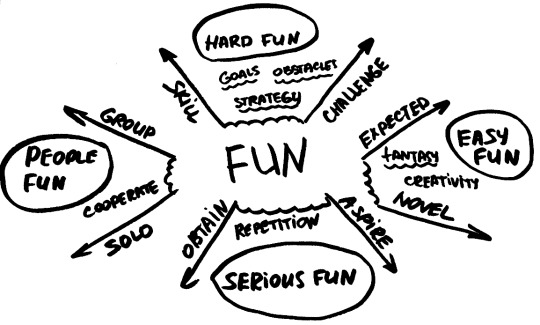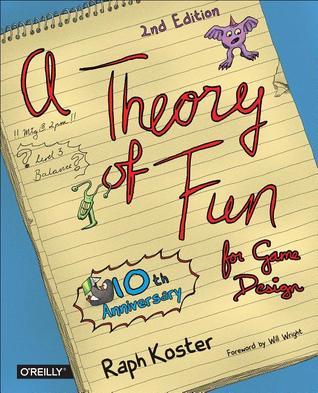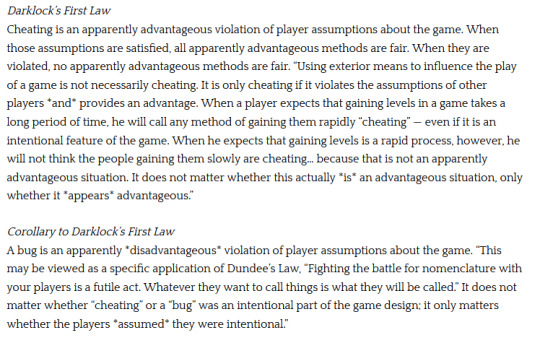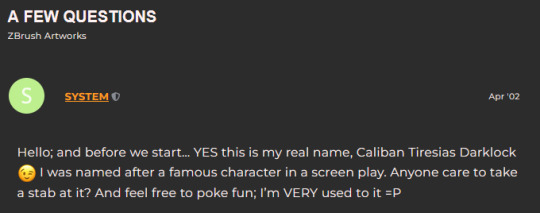#raph koster
Text
Where Interests Take You
I've been thinking about how the longer I go from spending time on social media, the more wide open my media diet is becoming.

View On WordPress
#40k#Alistair Cooke#breathing#Claire Rousay#design fiction#dougald hine#Dre labre#experience.computer#Forest Bed#graham mcneill#hg wells#impossible object#journalism#le guin#long form#media#media diet#narrative#PDF#psychodrama#Raph Koster#reading#rss#solarpunk#tv#ventris#video games#waldenponding#work
1 note
·
View note
Text
oh cool, raph koster's site still has all his design theory posts and interview transcripts dating back to '98. I know what I'm gonna be reading over the next few months
180 notes
·
View notes
Text
Raph Koster's "Still Logged In"
Just wanted to share my favourite talk of all time "Still Logged In: What AR and VR Can Learn from MMOs" by Raph Koster from the GDC 2017's Advocacy track. It touches on a lot of stuff, but most importantly ethics in community management, awareness of player needs and designing with player safety in mind. It's available for free on the GDC vault and well worth a watch!
It's name is a bit deceptive IMO as a fair amount of the advice is applicable if you're anyone who manages communities, operates any kind of project or studio, or works on anything remotely related to online content - it's not just applicable to AR/VR mediums. I'd highly recommend checking it out!
My favourite takeaway is that "Every feature must be looked at as a weapon", which this is something I think about a lot while designing Bombing!! 2: A Graffiti Paradise since players are 1) encouraged to be creative in a virtual environment and 2) share it online. I think about this a lot in every game I make!
(cw: Graphic descriptions of sexual assault and harassment in the talk)
#game dev#game design#indie games#game development#games#video games#indie game#solo dev#indie game dev#gamedev#gamedesign#indiedev#indie dev#indie developer
3 notes
·
View notes
Text
every day when I came home from 6th grade I would tell my parents my classes were too easy
"I already know all of this" I'd say. "Why am I learning this again?"
what I didn't realize then - and struggle to, now - is that the solidification of an idea is much harder and takes much longer than learning it.
the subconscious is fickle, and slow. it requires a lot of practice to learn things. and it requires deliberate practice, as proposed by raph koster.
deliberate practice is the act of learning things on purpose, integrating them into your muscle memory and your visualspatial sketchpad and everything else that makes up your brain
it takes a lot longer than understanding something intellectually.
personally, if I was in a good mood and had enough free time, I could probably do pretty much anything halfway decently, using just my intellect. but to do something masterfully or to do it under anything less that optimally, the rest of the body and mind is required. and learning to function in less than optimal conditions is an extreme necessity in this capitalist reality.
0 notes
Quote
古典的なゲーム デザイン入門書の 1 つ (Raph Koster 著『ゲーム デザインの楽しさの理論』[0]) は、楽しさとは何か、ゲームとは何かという問題に取り組もうとしています。 2ページごとにイラストがあり、さわやかな読み物です。 (特に、「さまざまな人々のためのさまざまな楽しみ」の章は、元の投稿の内容に非常に近いです。) いつ雑草に巻き込まれるかを定義するのは難しいです。 以下は本からの抜粋です。 > 多くの単純なことは、掘り下げていくと複雑になりますが、楽しむことは非常に基本的なものなので、もっと基本的な概念を見つけることができるのではないでしょうか? > 脳の仕組みについて読んだときに答えを見つけました。 私の読んだところによると、人間の脳はほとんどの場合、パターン、つまり概念の柔らかいずんぐりした灰色のパックマンを貪欲に消費しています。 ゲームというのは、食べてしまうのに非常においしいパターンばかりです。 Uplink には非常においしいパターンがいくつか含まれていると思います。これはまさに、ゲームを最初からやり直すときに自分がどれだけ上達したかに気づく感覚について作者が話しているときに話していることです。 もちろん、楽しさは二値的に分類できるものではありません。楽しさを高めるために「ジュース要素」などに重点を置いたゲームが数多くあることは間違いありません。 [0]: https://archive.org/details/theoryoffunforgamedesign2ndediti...
ビデオ ゲームの楽しい要素 Uplink | ハッカーニュース
1 note
·
View note
Text
Books for those who learn gamedesign
1.Raph Koster "Theory of fun for game design".
2. Jesse Schell " The art of game design : a book of lenses".
3.Steve Swink" Game feel: a game designer's guide to virtual sensation.
4. Scott Rogers " Level up! The guide to great video game design".
5. Tracy Fullerton " Game design workshop".
6.Katie Salen " Rules of play".
7.Ernest W. Adams " Fundamentals of game design".
0 notes
Text
Should Blizzard Take Action Against Diablo 4 Gold Sellers? Here's What Experts Say
As Diablo 4 fever spreads across the gaming community, so too does the temptation to buy gold from third-party sellers. While some players argue that it's a harmless way to expedite in-game progression, others worry that gold selling disrupts the balance of the game and encourages cheating. So, should Blizzard take action against Diablo 4 gold sellers? Here's what experts have to say.
The Fallout of Gold Selling
Many players argue that buying gold is a victimless crime – after all, it doesn't directly harm other players. However, the fallout of this behavior can be significant. For example, it can lead to inflation and market disruption, making it difficult for legitimate players to gain an economic foothold. Studies have also shown that gold sellers are often involved in hacking and account theft, putting players' personal information at risk. As Dr. Mark Griffiths, a professor of behavioral addiction at Nottingham Trent University explains in this BBC article, "The trading of virtual goods for real-life cash can pose problems for game makers and governments alike. It’s a grey area, and it’s not clear what the most effective way to tackle it is."
The Case for Inaction
Some experts argue that Blizzard should not take action against gold sellers. They point out that players will always find ways to gain an upper hand in games, and that policing this behavior is a futile effort. Furthermore, some argue that gold selling can be a valuable source of income for players living in regions with weak economies. As game designer and economist Edward Castronova explains in a MIT Technology Review article, "You could view some of the activity in games such as World of Warcraft as a kind of international trade...But it's not what most trade theorists have in mind when they use the term international trade."
The Case for Action
On the other hand, some experts argue that Blizzard has a responsibility to take action against gold sellers. They point out that the practice undermines the integrity of the game and leads to an uneven playing field. Furthermore, gold selling is often associated with organized crime and money laundering, making it a potentially serious legal issue. As security expert and tech consultant Graham Cluley explains in this Hot for Security article, "By buying in-game currency, items, or services from individuals or websites, you run the risk of indirectly supporting organized crime and potentially exposing yourself to becoming a victim of cybercrime."
The Middle Ground
Ultimately, the answer to this question may lie somewhere in the middle. Some experts argue that a "soft" approach – such as education campaigns and player incentives – might be more effective than a hard crackdown. Others suggest that Blizzard could implement game mechanics that make gold selling less appealing – such as improving the game's economy or offering more legitimate ways for players to gain gold. As game developer and writer Raph Koster explains in a blog post, "A player economy ridden with spammers and bots is a catastrophically broken thing, even when the game is still profitable. And that’s before you get into the stuff around fraud, piracy, and more serious stuff. But dealing with it is devilishly hard."
The Bottom Line
The question of whether Blizzard should take action against diablo 4 gold sellers isn't an easy one to answer. While some experts argue that gold selling is harmless or even beneficial, others are concerned about the negative consequences for players and the game itself. Ultimately, it may be up to Blizzard and other game developers to find creative solutions that balance the needs of players, game integrity, and social responsibility.
Article source: None
0 notes
Text
La théorie de Raph Koster : création d'expérience fun
Aujourd’hui, nous allons explorer une théorie simple mais puissante qui peut aider et inspirer la gamification et la conception de l’expérience utilisateur (UX).
Si nous devions identifier l’élément essentiel qui crée l’engagement et l’immersion dans les jeux et que nous ne devions citer qu’un seul ingrédient, quel serait-il ?
Nous allons essayer de répondre à cette question en expliquant la…

View On WordPress
0 notes
Text
Fun is about learning in a context where there is no pressure. - raph koster
0 notes
Text
Price: [price_with_discount]
(as of [price_update_date] - Details)
[ad_1]
This in-depth resource teaches you to craft mechanics that generate challenging, enjoyable, and well-balanced gameplay. You’ll discover at what stages to prototype, test, and implement mechanics in games and learn how to visualize and simulate game mechanics in order to design better games. Along the way, you’ll practice what you’ve learned with hands-on lessons. A free downloadable simulation tool developed by Joris Dormans is also available in order to follow along with exercises in the book in an easy-to-use graphical environment.
In Game Mechanics: Advanced Game Design, you’ll learn how to:
* Design and balance game mechanics to create emergent gameplay before you write a single line of code.
* Visualize the internal economy so that you can immediately see what goes on in a complex game.
* Use novel prototyping techniques that let you simulate games and collect vast quantities of gameplay data on the first day of development.
* Apply design patterns for game mechanics—from a library in this book—to improve your game designs.
* Explore the delicate balance between game mechanics and level design to create compelling, long-lasting game experiences.
* Replace fixed, scripted events in your game with dynamic progression systems to give your players a new experience every time they play.
"I've been waiting for a book like this for ten years: packed with game design goodness that tackles the science without undermining the art."
--Richard Bartle, University of Essex, co-author of the first MMORPG
��Game Mechanics: Advanced Game Design by Joris Dormans & Ernest Adams formalizes game grammar quite well. Not sure I need to write a next book now!”
-- Raph Koster, author of A Theory of Fun for Game Design.
ASIN : B008CG8E8Y
Publisher : New Riders; 1st edition (18 June 2012)
Language : English
File size : 38010 KB
Simultaneous device usage : Up to 5 simultaneous devices, per publisher limits
Text-to-Speech : Enabled
Screen Reader : Supported
Enhanced typesetting : Enabled
X-Ray : Not Enabled
Word Wise : Not Enabled
Print length : 442 pages
[ad_2]
1 note
·
View note
Text
[PDF Download] Theory of Fun for Game Design - Raph Koster
Download Or Read PDF Theory of Fun for Game Design - Raph Koster Free Full Pages Online With Audiobook.

[*] Download PDF Here => Theory of Fun for Game Design
[*] Read PDF Here => Theory of Fun for Game Design
Now in full color, the 10th anniversary edition of this classic book packs more insight into what it means to design games for fun. Theory of Fun for Game Design challenges and inspires game designers as well as game enthusiasts looking for products and experiences that are truly fun and entertaining.The book discusses the impact of designing in a multidimensional landscape, where computer science, environmental design, and storytelling all play a role in creating an interactive game design. For the professional game developer to the interested young gamer, this updated edition takes you on an illustrated ride in fun and games.Learn why some games are fun and others are boringDiscover how playing a game and learning are connectedUnderstand why making a game too hard--or too easy--is a mistakeFind out why games have to balance deprivation and overload, order and chaos, silence and noiseExplore why you need to balance challenges of task mastery, pattern recognition, discovery, and time
0 notes
Quote
When people today say sandbox versus themepark, they mostly mean simulationism versus stagecraft. [World of Warcraft] is a giant amazing piece of stagecraft. So is [Final Fantasy XIV]. But EVE [Online] is basically simulationist. […] [S]imulationism was born as a way to make fantasy worlds richer, more immersive
MMO dev Raph Koster disambiguates sandboxes, themeparks, simulation, and stagecraft | Massively Overpowered
0 notes
Text

thinking about how funny it is that there's a really good exploration into the nature of cheating in mmos on a philosophical level, but because it was written when it was (and compiled by raph koster), it's --

hang on, post cancelled, this is apparently one of the only real names in the entire list. huh. he's still around, even
130 notes
·
View notes
Text
What Is a Game?

We probably all have a pretty good intuitive notion of what a game is. The general term "game" encompasses board games like chess and Monopoly, card games like poker and blackjack, casino games like roulette and slot machines, military war games, computer games, various kinds of play among children, and the list goes on. In academia we sometimes speak of game theory, in which multiple agents select strategies and tactics in order to maximize their gains within the framework of a well-defined set of game rules. When used in the context of console or computer-based entertainment, the word "game" usually conjures images of a three-dimensional virtual world featuring a humanoid, animal or vehicle as the main character under player control. (Or for the old geezers among us, perhaps it brings to mind images of two-dimensional classics like Pong, Pac-Man, or Donkey Kong.) In his excellent book, A Theory of Fun for Game Design, Raph Koster defines a game to be an interactive experience that provides the player with an increasingly challenging sequence of patterns which he or she learns and eventually masters. Koster's asser-tion is that the activities of learning and mastering are at the heart of what we call "fun," just as a joke becomes funny at the moment we "get it" by recognizing the pattern.
Video Games as Soft Real-Time Simulations
Most two- and three-dimensional gamesvega video games are examples of what computer scientists would call soft real-time interactive agent-based computer simulations. Let's break this phrase down in order to better understand what it means. In most video games, some subset of the real world -or an imaginary world- is modeled mathematically so that it can be manipulated by a computer. The model is an approximation to and a simplification of reality (even if it's an imaginary reality), because it is clearly impractical to include every detail down to the level of atoms or quarks. Hence, the mathematical model is a simulation of the real or imagined game world. Approximation and simplification are two of the game developer's most powerful tools. When used skillfully, even a greatly simplified model can sometimes be almost indistinguishable from reality and a lot more fun.
An agent-based simulation is one in which a number of distinct entities known as "agents" interact. This fits the description of most three-dimensional computer games very well, where the agents are vehicles, characters, fireballs, power dots and so on. Given the agent-based nature of most games, it should come as no surprise that most games nowadays are implemented in an object-oriented, or at least loosely object-based, programming language.
1 note
·
View note
Link
Congratulations to online gaming pioneer Raph Koster, whose company, Playable Worlds, raised $2.7 million. The company has a plan for a platform that combines building, gaming and socializing online. Koster and his team are veterans of Ultima Online, Star Wars Galaxies, and other online games.
1 note
·
View note
Text
Friday Bullet Points on a Chilly Spring Saturday
Friday Bullet Points on a Chilly Spring Saturday
[This was supposed to be yesterday’s post, but then I woke up to a big news event, so it is a day late.]
It is cold out, considering it is spring here in California. It has even rained here in the last 24 hours. I am wearing a sweatshirt and jeans, which isn’t exactly the gear of arctic explorers, but by this late in April I have generally been well into the “I will wear shorts every day until…

View On WordPress
0 notes